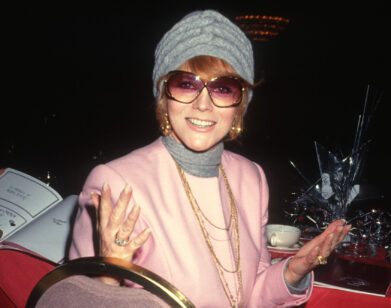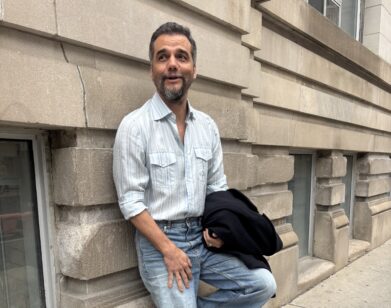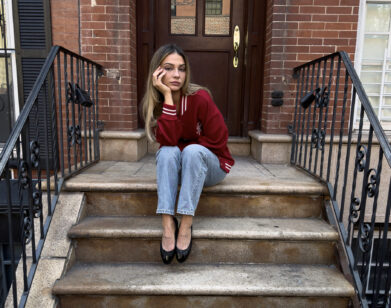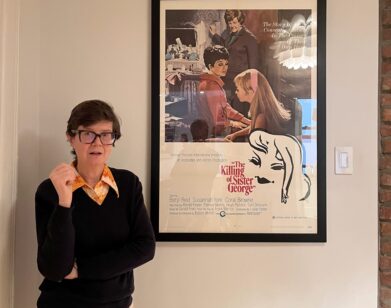Kieran Culkin
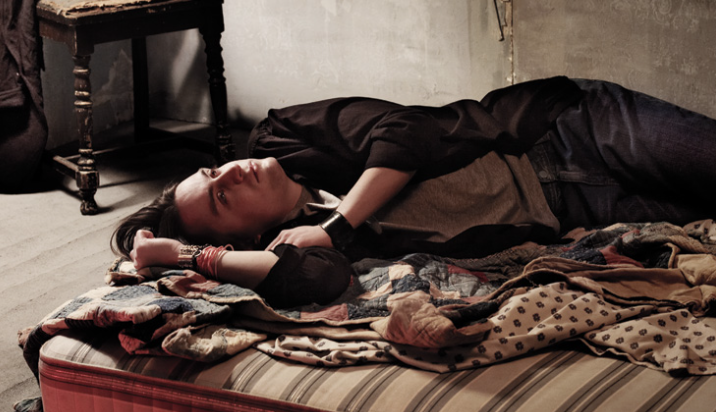
The thing that’s striking about Kieran Culkin in person is his indistinctiveness: He’s smaller, more diffuse, and more everyguy than the sharp and damaged characters on which he’s made his name. In blue jeans and jacket he’s unrecognizable on an East Village street; in conversation he’s as funny and loquacious as a corner bartender. Turns out that’s by design, and probably therapeutic: As ascion of one of Hollywood’s largest and most controversial stage families, he started film acting at the age of 7, and ever since has endured tabloid noise about his father’s mismanagement of his older brother Macaulay’s runaway stardom from the Home Alone films—a pop-culture juggernaut that threatened to typecast the entire family by default.
But Kieran definitively overcame his surname’s baggage with 2002’s Igby Goes Down, where he held his own against Susan Sarandon as a morose upper-class teen bedeviled by his crazy family. He won widespread praise and a Golden Globe nomination. Then he disappeared, doing a play in London and hiding out in his downtown Manhattan apartment. Seven years later, he’s back, with Lymelife, a pointed and intense story of two disintegrating Long Island families in the late ’70s set against the first wave of national hysteria about Lyme disease. It co-stars Alec Baldwin, Cynthia Nixon, Timothy Hutton, and Jill Hennessy. Culkin plays Jimmy, older brother to Scott (played by Culkin’s real-life brother Rory) and a soldier facing deployment who finds himself wedged between his warring parents. Also on Culkin’s calendar is Margaret, a Kenneth Lonergan drama co-starring Anna Paquin.
Just as things were looking up professionally for the 26-year-old actor, tragedy struck: His older sister Dakota was killed in an auto accident at the end of last year. Culkin considered going back into seclusion but attended Sundance with his brother Rory, where Lymelife was greeted with rapturous reviews. He planned to spend Valentine’s Day with his mother and godfather. On that very afternoon, we sat down for lunch near his East Village apartment to talk about where he’s been and where he’s going.
MICHAEL MARTIN: What grabbed you about the script for Lymelife?
KIERAN CULKIN: It’s the basic questions that always throw me . . . I don’t know. I always try to look at it as a whole. When I read a script this good, do I want to be part of it? Also, I’d been part of it for seven years before we started shooting [He participated in an early reading of the movie at the Sundance Filmmakers Lab in 2001], and so had my brother Rory. He jokes that he’s been part of it for half his life. It was just a really well-written thing, and I was waiting for it to come together. I went to school with one of the writers, Steven Martini. He was seven grades above me.
MARTIN: Where did you go to school?
CULKIN: PCS . . . [sheepishly] Professional Children’s School.
MARTIN: Ah . . .
CULKIN: Ah! You’ve heard of it?
MARTIN: Yeah, every now and again—usually in proximity to huge fame.
CULKIN: Oh, yeah. Well, almost everyone who’s gone there says it in the same sheepish way that I did. I’m really embarrassed to say that.
MARTIN: What about Lymelife’s depiction of family was interesting to you?
CULKIN: It was sort of weird for me . . . I played the older brother, Jimmy, who seems to know more of what’s going on with the family, as opposed to the younger brother, who’s been shielded from it his entire life. That’s the point of the movie—it’s the younger brother’s coming of age. It’s realizing that his parents are just people. Jimmy has been aware of this for years.
MARTIN: Anything you could relate to personally? Your family has had its share of chaos.
CULKIN: There was not a really conscious connection. Rory and I had to look at each other like, “Did you experience this?” You always make a connection; you always have to draw from something. But I never had to say, “Oh, this reminds me of my family.” I think it’s something that people can all relate to—no family’s perfect.MARTIN: What was it like to work with your brother?
CULKIN: It was awesome. I always thought it would be cool to work with him. When it was time, I wasn’t sure how to approach it, so I said I’m going to approach it like any other job. Then I got a little nervous: I would say a line and look in his eyes, and he would know I was bullshitting, because he knows me better than most anybody on the planet. Your bullshit meter is turned way the fuck up when your brother is there.
MARTIN: This is the second time the two of you have worked together.
CULKIN: The first time we didn’t actually work together. He played the younger version of who I played in Igby Goes Down. There’s a lot of that. My brother Chris and I worked together when he was 10 and I was 6. My sister Quinn and my brother Mac worked together in The Good Son [1993]. It’s always been going on with the Culkins. I worked with Mac in that Home Alone [1990] thing. Ha! I say “worked with,” and I was fuckin’ 7. I was told where to stand and say my lines. [laughs] I had to give a bio for a play I was doing, and I asked my manager to do it. She wrote, “His first role was as McCallister in Home Alone. He reprised the role in Home Alone 2.” I called her and said, “I did not reprise the fucking role. I was 8! Get out of here!”
MARTIN: Was it predestined that you would be an actor?
CULKIN: I don’t know. My father was an actor, and he wanted all of us to get into it—seven of us. It stuck for three of us, maybe more, I don’t know.
MARTIN: Did you resent that?
CULKIN: I was just sort of young and went with the flow. It wasn’t like I was 6 and knew I wanted to be an actor. I was thinking more along the lines of, I’m 6. When I was 20 I realized, I’ve never really thought about what I want to do. So I took a bunch of time off, stopped answering my phone, stopped doing anything. I’m pretty sure this is what I want to do, but I needed to be sure. It took me about two years to come around.
MARTIN: With Igby Goes Down, you got attention, acclaim, a Golden Globe nomination. Then you disappeared. Now it’s seven years later.
CULKIN: Just as all that Igby stuff was happening, I went to London to do a play, This Is Our Youth. It was draining, but a great fuckin’ show. After the last day of the run, I literally flew back from London to go to the Golden Globes. All that was intense, and I realized that I hadn’t thought about whether I wanted to do it or not. A bunch of projects came up in my face, and I felt a tremendous amount of pressure. I didn’t make a decision. I ignored everybody, stopped reading scripts . . . It was probably a little freakout on my part from getting attention all of a sudden. That’s not necessarily what I want, ever. The goal for me in this business is to work on things I want to work on, and be as successful as I can, without achieving any sort of attention or fame. That would be the best. That would be ideal.
MARTIN: What did you do? Hide out in an ashram?
CULKIN: I was not going on my spiritual journey. I lived. I was in my apartment hanging out with my cat and not giving a damn . . . But I kept an eye out for things. I knew that I was young and could come back to it if I wanted.
MARTIN: What was it like to work with Alec Baldwin in Lymelife? You have a pretty violent father-son confrontation scene.
CULKIN: He’s intense. He had ideas about that big scene. “You can grab me by the throat, you can throw me against the wall, you can do whatever you want.” It was like, Great! That’s just awesome that he would do that. I meant to reciprocate. But I didn’t. He took it upon himself to just smack the shit out of me. [laughs] I thought, All right, he just hit the shit out of me. I didn’t say okay—I guess he assumed I was down for that. But that was actually really cool.
MARTIN: Did he give you any advice?
CULKIN: I’ve always found that to be odd. I’ve heard of actors giving advice to other young actors, and I’ve never really been there for that. It’s weird to say, but I’ve been doing this for 20 years. I don’t think I’ve been in a position to give advice, and I don’t think I could take it.MARTIN: You co-star with Anna Paquin in the Kenneth Lonergan movie Margaret. What do you get to do?
CULKIN: I have a small bit that you can basically cut out of the movie. I play Paul, the guy who comes over and deflowers her. She calls him up and says, “Hey, would you like to take my virginity?” Okay . . .
MARTIN: Was the sex scene embarrassing?
CULKIN: It’s not supposed to be the best sex in the world. I’ll put it this way: It lasts all of 30 seconds.
MARTIN: Which is similar to the uncomfortable sex scene your younger brother has in Lymelife.
CULKIN: Similar, but a little different. The scene with Rory and Emma [Roberts] is really . . . I don’t know what words to use because it’s my brother. You feel like you’re in the room and you really shouldn’t be. Really painfully awkward.
MARTIN: Tell me about Paper Man, your next film that’s coming out.
CULKIN: The basic plot is that this writer, played by Jeff Daniels, rents himself and his wife a house in the Hamptons. He’s got a novel to write, and he can’t even get started. He brings his imaginary friend named Captain Excellent. As much as he’s told Captain Excellent to stay behind, he’s getting harassed by him. I play a neighborhood kid.
MARTIN: When you came back to films, did you decide to keep going?
CULKIN: After two years, I said I was going to do a play and see if this is what I want to do. The play made me realize that I wanted to do this. I’m just in Margaret a small amount, but I think it’s a great movie. Paper Man is the best script I’ve ever read, and I’ve been chasing it for four years. The fact that these are happening at the same time is coincidental. If it takes me another five years to find another Lymelife or Paper Man, so be it.
MARTIN: If it does take five years, what would you do to earn money?
CULKIN: I don’t know. I’m not really good at much. I’m not that great . . . I guess if it took me five years, I’d stop spending money.
MARTIN: You’re going from zero to 60 now. You have several films lined up.
CULKIN: A lot of that is false. There are two things listed on the Internet that aren’t real movies, and something I’ve been attached to for two years.
MARTIN: Let’s go through some of them. Three Stories About Joan—Bruce Willis’s directorial debut?
CULKIN: We went to start shooting that and production closed down.
MARTIN: Scott Pilgrim vs. The World—you’re playing Michael Cera’s gay roommate?
CULKIN: I can’t talk about that, because I don’t know if it’s real. All my friends have been calling me and saying, “Hey, this is really cool.” I know better than to ever call and congratulate anyone about a movie. I had this one friend who would congratulate me about movies I’d never even heard of. The last thing I’ve heard is that I’m not doing it.
MARTIN: How are you and your family coping with your sister’s death?
CULKIN: It’s been a rough couple of months. I won’t speak for anyone else, but I’m doing okay. That’s the point of doing this interview and stuff. For a little while there, I wasn’t going to do any press. I wasn’t going to do Sundance. This was all a sort of getting-out-of-bed-and-start-walking thing.
MARTIN: Why do you do stage?
CULKIN: I think there’s a nice middle ground you can find. I’ve talked to film actors who are scared of doing theater because you “have to be bigger.” You don’t necessarily have to. You have to be louder, but it doesn’t necessarily have to change so much what you do. I hear of actors doing theater because they like the instant gratification. If anything, that’s a turnoff to me.
MARTIN: I’m guessing you don’t spend a lot of time in Hollywood.
CULKIN: [laughs] It’s impossible. I did that circuit for a while, when I was meeting studio execs, and I was like, What am I meeting you for? Hire me or don’t—I’m an actor, not a businessman. I’ve heard about these general meetings . . . I’ve done one or two. “Oh, this actor wants to meet you.” “What about?” “Oh, they just want to meet you.” That’s retarded. I mean, that’s great, it’s nice to meet you, but we have nothing to talk about.
See More from InterviewMagazine.com
Photo: Kieran Culkin in New York, January 2009. Shirt: Y’s by Yohji Yamamoto. T-shirt and jeans: Michael Kors. Blazer (on chair): Comme des GarÇons. Bracelets: guess and Culkin’s own. Hair products: Redken, including Get Groomed Finishing Cream. Fragrance: Michael by Michael Kors. Styling: James Valeri. Hair: Holli Smith/Community NYC. Makeup: Mariel Barrera/Joe Management. Set design: Jim Gratson/Creative Exchange Agency. Special thanks: Fast Ashleys.

